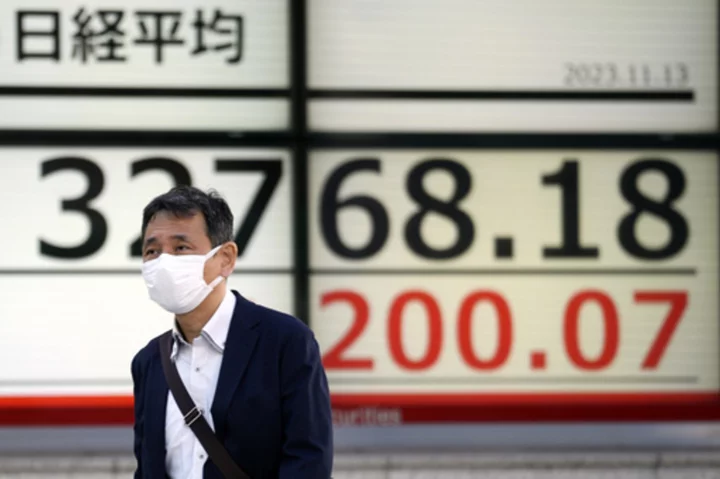HONG KONG (AP) — Shares edged lower Monday in quiet trading in Asia ahead of a meeting this week between U.S. President Joe Biden and Chinese leader Xi Jinping.
Tokyo advanced but other markets were little changed, edging lower. Oil prices fell.
Biden and Xi are due to meet on the sidelines of the Asia Pacific Economic Cooperation summit this week amid hopes for improved ties between the two biggest economies.
On Friday, Wall Street rose sharply to add to an already strong November, which is on track to be one of the market’s best months of the year. Expectations for an interest rate hike by the U.S. Federal Reserve in December, despite a report showing consumer inflation expectations on the rise.
Tokyo's Nikkei 225 added 0.5% to 32,742.00 and the Hang Seng in Hong Kong edged 0.1% higher to 17,227.10.
The Shanghai Composite index slipped 0.1% to 3,035.95 and the Kospi in Seoul also fell 0.1%, to 2,408.37.
Australia's S&P/ASX 200 declined 0.1% to 6,972.20.
On Wall Street on Friday, the S&P 500 jumped 1.6% to 4,415.24. The Dow gained 1.2% to 34,283.10, and the Nasdaq jumped 2% to 13,798.11.
Big Tech stocks were the strongest forces pushing upward on the S&P 500, including a 2.3% gain for Apple and 2.5% rise for Microsoft.
This earnings reporting season is turning out much better than analysts expected, and it’s likely to show the first growth in earnings per share for S&P 500 companies in a year, according to FactSet. But the focus is swinging toward what companies will do later this year and beyond as interest rates remain high and the U.S. economy is expected to slow.
Hologic jumped 7.3% for the biggest gain in the S&P 500 after the maker of diagnostics and other products focused on women’s health reported better profit for the latest quarter than expected.
Doximity was another winner, up 16.2% after it likewise reported stronger profit than forecast.
The Federal Reserve has said it wants to keep such expectations low because they otherwise could lead to a vicious cycle that keeps inflation high. The release of the University of Michigan report initially caused Treasury yields to pare their drops, which caused stock indexes to wobble. But the stock market quickly shrugged off the data and continued to rise.
By late Friday, traders were betting on only a 9.1% chance that the Fed will raise its main interest rate at its next meeting in December, according to data from CME Group. That's down from 14.6% a day earlier.
High interest rates and bond yields hurt prices for stocks and other investments, while slowing the economy broadly and raising the pressure on the financial system in hopes of getting inflation under control.
On Thursday, a jump in Treasury yields knocked stocks lower to break an eight-day winning streak for the S&P 500, one of its longest in the last two decades. That came after the Fed's Powell dashed some of the hopes building among traders that the Federal Reserve may finally be done hiking its main interest rate.
After the 10-year Treasury yield popped above 5% last month to its highest level since 2007, in part on expectations for big borrowing by the U.S. government, the S&P 500 briefly dropped more than 10% below its high point for the year. Since then, the market has rebounded as “year-end greed” set in and the 10-year yield regressed, the strategists wrote in a BofA Global Research report.
In the oil market early Monday, a barrel of benchmark U.S. crude for delivery in December lost 55 cents to $76.62. It rose $1.43 on Friday to settle at $77.17.
Brent crude, the international standard, was down 60 cents at $80.83 per barrel. On Friday it added $1.42 to $81.43 per barrel. Both still lost close to 4% last week on worries about supplies outstripping demand.
In currency dealings, the dollar rose to 151.66 Japanese yen from 151.47 yen. The euro was unchanged at $1.0686.

